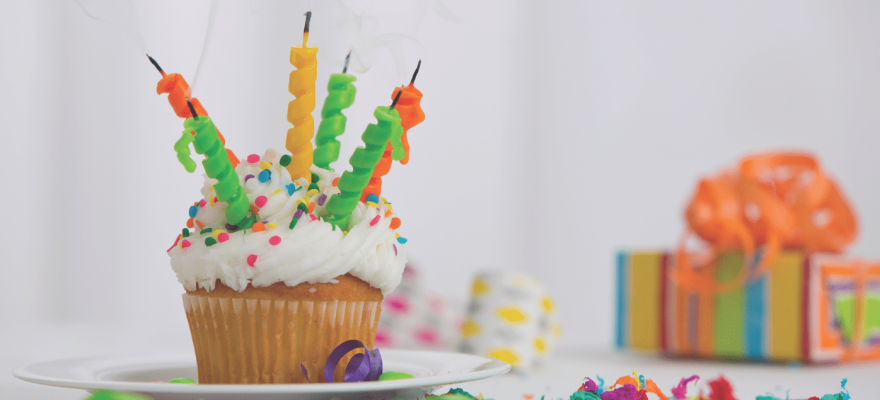
Birthdays. They come once a year and are usually met with much anticipation and excitement by the celebrated boy or girl. When you think birthdays, you think balloons, cake, ice cream, friends and presents, right? Those are all wonderful traditions but what happens when you have a child who actually acts out (in a defiant) way, when all of these good things are going on around them? Children with Sensory Processing Disorder (SPD) want to be celebrated like any other child but for the parents who have to watch the tailspin of emotions that come from what was supposed to be a great day to what has now become a dreaded occasion – can be very tough. Let these 6 tips help you celebrate and enjoy your child on their birthday because when it really comes down to it, they want to be loved on just like everyone else.
1. Bigger isn’t always better.
I used to tell myself that I had to invite every single one of my son’s friends to his birthday party in order for it to be a success. Wrong. The more kids I invited, the more hyper he got because there was just too much going on for him to focus on what the occasion was really about; him. Now we let him invite one friend to do one special thing and the focus becomes about the experience and not the behavior.
2. No hype.
Remind your child that her birthday is coming up and that you are so excited to be celebrating her special day. Talk to her about her very first birthday and share photos with her from years past. If you want to take this up a notch, take her to all the Birthday Party locations that you’ve been to, and make her reminisce of the memories. Instill the idea that the day she was born was one of the best days of your life and that you are so thankful to have her has as your daughter. This special moment will prioritize what is really important about her upcoming day; that she is happy, healthy and loved. Sometimes when parents build up the big day, it can become too overwhelming for their child to understand. No need to down play the big day but do not build so much anticipation that your child is unrealistic about what to expect.
Read Next | These Are the Early Signs of Autism in Kids
3. Kids who are sensory seeking
(Like loud noises, have a hard time understanding personal space, are loud, and in general, pretty hyper) are easily swept up in the chaos that can come with a birthday party. Think outside the box and invite one or two friends to keep the noise level to a minimum to help your child function on his special day. Visit vegaspartypeople.com/las-vegas-party-bus-rentals/ to get the most value for your dollar.
4. Kids who are sensory avoiding
(Get stressed out by loud noises, do not like to be touched, get overwhelmed when there are multiple things going on) will most likely act out if they cannot process what is going on around them. Remove the obstacles before the party even begins and set your child up for success. Instead of latex balloons that pop easily and make loud noises that can scare children, opt for Mylar balloons. They last longer and are less likely to pop. Instead of buying your child 10 gifts that she will likely forget about once she has opened them, buy her two or three gifts that you know she will get lots of play out of and that are equally beneficial to her (necklace-making kit, dinosaur excavation kit or water beads). It is simply too much for a child with sensory issues to be expected to sit still in front of 20 people, opening gifts, saying thank you, and remaining calm. Know your child’s limits and work around them.
Read Next | How to Set Ground Rules and Boundaries with Your Toddler
5. Pick the right time of day.
If you know your son is usually grumpy in the morning but acts pretty happy in the afternoon, then plan a get together in the afternoon. If you have a big family and you know your child does not do well with lots of people around, turn his birthday into a birth-week and space out when he sees people. This will be more fun for everyone involved. Family gets a chance to celebrate and notice the birthday boy and you get to be around an equally happy child who is more likely to act appropriately when the attention is directed at him.
6. Don’t expect too much.
If you notice that everything going on around her is overwhelming your child, then take a time out. Let your child have a few minutes to herself to collect her thoughts and take things down a notch. Maybe instead of playing Pin the Tail on the Donkey, you opt for a coloring contest where each person gets a prize for participating. Children with SPD have a hard time understanding social situations that other people just simply know how to handle. Take the drama out of a birthday meltdown and create an environment where everyone wins.
Celebrating a birthday can be bittersweet for the parents of children with SPD. Most likely, we have thought of every way possible to make the day a great one for our child, only to be disappointed when they act out from not being able to process all that is going on around them. This heavy weight of guilt washes over us as if we cannot breathe and we start to question whether or not we are good parents for only allowing our child to invite one friend to his party. Let go of the guilt and accept the reality for what it is. Your child functions better when things are simple. Celebrate that and while you are at it, celebrate the fact that you and your child have made it one more year growing in this SPD world together.
Meagan Ruffing is a parenting journalist with a sensory seeking and sensory avoiding child. She encourages other parents to learn as much as they can about their child’s diagnosis to help cultivate a happy and healthy home environment for the entire family. • www.meaganruffing.com

Read Next | Learn about All the Best Pre-school or Daycare Centers on Staten Island







